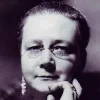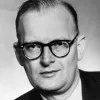This innocent country set you down in a ghetto in which, in fact, it intended that you should perish. Let me spell out precisely what I mean by that, for the heart of the matter is here, and the root of my dispute with my country. You were born where you were born and faced the future that you faced because you were black and for no other reason. The limits of your ambition were, thus, expected to be set forever. You were born into a society which spelled out with brutal clarity, and in as many ways as possible, that you were a worthless human being. You were not expected to aspire to excellence: you were expected to make peace with mediocrity.
James Baldwin (1924-1987) American novelist, playwright, activist
The Fire Next Time, “My Dungeon Shook” (1963)
(Source)
Quotations about:
limitations
Note not all quotations have been tagged, so Search may find additional quotes on this topic.
Learning too soon our limitations, we never learn our powers.
Mignon McLaughlin (1913-1983) American journalist and author
The Neurotic’s Notebook, ch. 2 (1963)
(Source)
It is a very wise rule in the conduct of the understanding, to acquire early a correct notion of your own peculiar constitution of mind, and to become well acquainted, as a physician would say, with your idiosyncrasy. Are you an acute man, and see sharply for small distances? or are you a comprehensive man, and able to take in, wide and extensive views into your mind? Does your mind turn its ideas into wit? or are you apt to take a common-sense view of the objects presented to you? Have you an exuberant imagination, or a correct judgment? Are you quick, or slow? accurate, or hasty? a great reader, or a great thinker? It is a prodigious point gained if any man can find out where his powers lie, and what are his deficiencies, — if he can contrive to ascertain what Nature intended him for.
Sydney Smith (1771-1845) English clergyman, essayist, wit
Lecture (1804-1806), Moral Philosophy, No. 9 “On the Conduct of the Understanding,” Royal Institution, London
(Source)
Collected in Elementary Sketches of Moral Philosophy (1849).
Knowledge is not happiness, and science
But an exchange of ignorance for that
Which is another kind of ignorance.George Gordon, Lord Byron (1788-1824) English poet
“Manfred,” Act 2, sc. 4 [First Destiny] (1817)
(Source)
We cannot all do everything.
[Non omnia possumus omnes.]Virgil (70-19 BC) Roman poet [b. Publius Vergilius Maro; also Vergil]
Eclogues [Eclogae, Bucolics, Pastorals], No. 8 “Pharmaceutria,” l. 63 (8.63) (42-38 BC) [tr. Mackail (1899)]
(Source)
Invoking the Pierian Muses to finish the tale, after the singer has given the first half.
(Source (Latin)). Alternate translations:All cannot all things do.
[tr. Ogilby (1649)]We cannot all do all things.
[tr. Davidson (1854), Wilkins (1873), Greenough (1895), Day Lewis (1963), @sentantiq (2018)]Scarce may all do everything.
[tr. Calverley (c. 1871)]We are not equal all
To every theme.
[tr. Palmer (1883)]All things are not possible to all.
[tr. Bryce (1897)]We cannot all do everything.
[tr. Fairclough (Loeb) (1916)]We are not all sufficient for all things.
[tr. Mackail/Cardew (1908)]No single singer touches all the chords.
[tr. Williams (1915)]We cannot all succeed in every task.
[tr. Rieu (1949)]For none of us all is skilful in all things.
[tr. Johnson (1960)]We are not all capable of all things.
[tr. Kline (2001)]
To know one’s own limitations is the hallmark of competence.
Dorothy Sayers (1893-1957) English author, translator
Thrones, Dominations, ch. 5 (1998) [with Jill Paton Walsh]
(Source)
Walsh completed the novel left unfinished at Sayers' death.
It is hardly in human nature that a man should quite accurately gauge the limits of his own insight; but it is the duty of those who profit by his work to consider carefully where he may have been carried beyond it. If we must needs embalm his possible errors along with his solid achievements, and use his authority as an excuse for believing what he cannot have known, we make of his goodness an occasion to sin.
William Kingdon Clifford (1845-1879) English mathematician and philosopher
“The Ethics of Belief,” Part 2 “The Weight of Authority,” Contemporary Review (Jan 1877)
(Source)
I have no time to scold, and I learned thirty years ago it was foolish to scold. I have enough trouble overcoming my own limitations without fretting over the fact God has not seen fit to distribute evenly the gift of intelligence.
John Wanamaker (1838-1922) American merchant, marketer, philanthropist, Postmaster General
Quoted in Herbert Adams Gibbons, John Wanamaker, Vol. 2 (1926)
(Source)
Variant paraphrase: "It's foolish to scold people. I have enough trouble overcoming my own limitations without fretting over the fact that God didn't see fit to distribute brains equally."
I think perhaps the most important problem is that we are trying to understand the fundamental workings of the universe via a language devised for telling one another when the best fruit is.
His imagination resembled the wings of an ostrich. It enabled him to run, though not to soar. When he attempted the highest flights, he became ridiculous; but, while he remained in a lower region, he outstripped all competitors.
The Abilities of Man must fall short on one side or other, like too scanty a Blanket when you are a-bed. If you pull it upon your Shoulders, you leave your Feet bare; if you thrust it down upon your Feet, your Shoulders are uncovered.
William Temple, 1st Baronet Temple (1628-1699) English statesman and essayist.
Miscellanea (1705)
(Source)
Presidents quickly realize that while a single act might destroy the world they live in, no one single decision can make life suddenly better or can turn history around for the good.
Lyndon B. Johnson (1908-1973) American politician, educator, US President (1963-69)
Speech (1966-09-13), Signing a Bill Extending the Peace Corps Act, Georgetown University
(Source)
Broader context:To hunger for use, and to go unused, is the worst hunger of all. [...] It is true that few men have the power by a single act of theirs or in a single lifetime to shape history for themselves. Presidents, for example, quickly realize that while a single act might destroy the world they live in, no one single decision can make life suddenly better or can turn history around all for the good. But Presidents do know that a nation is the sum total of what we all do together; that the deeds and desires of each citizen fashion our character and shape our world -- just as one tiny drop of water after another will ultimately make a mighty river.
Sail, quoth the King; hold, saith the Wind.
Thomas Fuller (1654-1734) English physician, preacher, aphorist, writer
Gnomologia: Adages and Proverbs (compiler), # 4064 (1732)
(Source)
LONDO: There comes a time when you look into the mirror, and you realize that what you see is all that you will ever be. Then you accept it, or you kill yourself. Or you stop looking into mirrors.
“I beseech ye in the bowels of Christ, think that ye may be mistaken.” I should like to have that written over the portals of every church, every school, and every court house, and, may I say, of every legislative body in the United States. I should like to have every court begin, “I beseech ye in the bowels of Christ, think that we may be mistaken.”
Learned Hand (1872-1961) American jurist
Testimony, US Senate Committee on Labor and Public Welfare, Special Subcommittee on the Establishment of a Commission on Ethics in Government (1951-06-28)
(Source)
This was a favorite phrase of Hand's regarding his own judicial philosophy. Quoting Oliver Cromwell's letter to the General Assembly of the Church of Scotland (Aug 1650) before the Battle of Dunbar.
Collected as "Morals in Public Life" in Irving Dillard, ed., The Spirit of Liberty (1952).
It is only when the rich are sick that they fully feel the impotence of wealth.
Charles Caleb "C. C." Colton (1780-1832) English cleric, writer, aphorist
Lacon: Or, Many Things in Few Words, Vol. 1, § 538 (1820)
(Source)


















